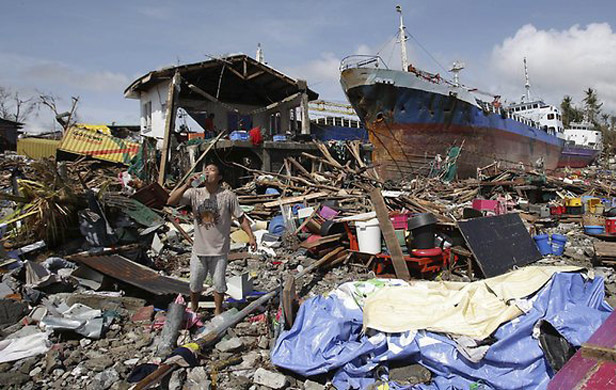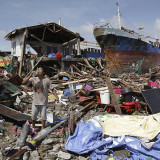
Platitudes are wholly incompatible with our present environmental situation on planet Earth, so saccharine pleasantries would be quite inappropriate to summarize the events of 2013. The natural world continues to be under ominous assault. The collective awareness of humanity and its political leadership has still not registered the urgency of the problem with enough clarity to effect the required changes in our behaviour. Global remedial action has been halting at best, leaving limited initiatives to be taken by communities, cities and a few countries. However heroic these efforts may be, they are insufficient to address the magnitude of the challenge.
If modern science is correct, the opportunity for avoiding critical ecological instability is rapidly shrinking — if it’s not already too late — and the pressure is building for corrective measures. So 2014 arrives with an anxious dread brought by a sense of impending inevitability, and a sense of frail hope inspired by remote possibility.
Hope and dread
The dread presently exceeds the hope because none of the major ecological problems facing the planet are being successfully addressed. Greenhouse gas emissions continue to rise, so temperatures are increasing in tandem — albeit more slowly for unknown reasons — and ocean acidification worsens. Species extinction is in free-fall due to climate change, habitat loss and biological homogenization. Soil, water and forest resources are either threatened or in decline almost everywhere.
Shortages in oil and gas supplies has been alleviated by extensive fracking but this has exacerbated the carbon dioxide problem, abetted by increases in global coal consumption. Glaciers and ice sheets are melting so ocean levels continue to rise. Industrial ocean fisheries are still ravaging most of the world’s marine stocks while mercury toxicity contaminates the remaining large fish. Coral reefs are dying and oceanic dead zones are proliferating. The threatening health effects of chemical and plastic pollution have become ubiquitous. Climate change refugees are a new and growing challenge to social, economic and political stability. Even our world-wide financial system is showing signs of vulnerability.
The law of limits
Optimism is shrinking as we encounter complexities that seem beyond our character, resolve and ability to address. Yes, we are making notable advances in technology, biology, physics, medicine, communication and general knowledge. But these accomplishments are occurring with the dawning realization that we may have a fundamental defect in the structure of civilization itself, together with our inability to recognize, confront, accept or alter its course. As the momentum of global industrialization leaves nature in tatters, we have so far avoided a predicted collision with the law of limits. But a haunting and collective nervousness is beginning to emerge as our human population soars, as the speed of our technological and consumer enthusiasm spreads, and as the ominous wall of limits seems to loom closer.
Even an assessment of our social ecology is sobering. A economic philosophy continues to widen the gap between rich and poor, threatening the civic adhesives of justice, fairness and opportunity that keep societies contented and peaceful. Serious questions are being asked about the ability of free-market capitalism to function within the bounds of nature’s imperatives.
The folly of 2008’s gross financial irresponsibility in international monetary dealings continues to cause worldwide personal and collective strife. Constraining regulations have been vigorously resisted by financial institutions, underscoring the danger of combining human greed with unfettered financial markets as a viable model for managing humanity’s economic interests. And finally, global demographic changes are unsettling many social ecologies.
Increasing population, complexity
Humanity’s population continues to rise, although a few countries are now dealing with the social and economic problems posed by falling populations — a measure of the degree to which perpetual growth has been equated to our sense of progress. Adjusting to an eventually stable human population is going to be difficult enough; adjusting to unequal demographic changes among countries is going to be even more difficult.
Perhaps the most subtle, powerful and discernible development during 2013 has been the penetrating insights about our human character arising from sophisticated thinkers. They are now articulating their serious doubts about our ability to manage a civilization that is rising exponentially in complexity. Neuroscience has added considerably to our understanding of the individual and collective psychology that motivates and governs our behaviour. The indications are not reassuring. We are not, for example, as rational, pragmatic or foresighted as we like to think we are. Our confidence usually overshadows our competence. Our survival strategies as individuals are more evolved than they are as groups — this is why we have persisted as a species but most human civilizations have not.
Capacity for self-reflection
The high opinion we have of ourselves is constantly being lowered by the honesty of self-examination. Our relative status continues to decline as we learn of the other marvellous living creatures that are indispensable components of the incredible intricacy of life on Earth. If we are any more amazing than ants and elephants or mosses and lichen, if we have any uniquely commendable attributes, it would seem to be the range of our awareness and our capacity to be reflectively conscious.
If this is the case, then our abusive treatment of the miracle of a living Earth would be all the more abject, deprived and inexcusable, our squandering and pillaging of its treasures even worse than wanton. Our present behaviour not only diminishes the planet but it also diminishes us. As our tiny measure of time ticks off another year, we need to weigh our small gains and accomplishments against our great failings and losses.
Maybe 2014 will be a wiser year.


Excellent article.
“Action” remains.
Ray,
Ray,
An excellent but disturbing look at our species and its behavior. The related question is ‘How do we get the political process into gear to begin to deal with such issues. A credit to you is that putting the case down is a valuable start.
G.F.H.
Hey, Ray. Happy New Year.
2014, this is the year where we end our three-decade fiasco.
http://the-mound-of-sound.blogspot.ca/2013/12/2014-return-of-occupy.html
MoS